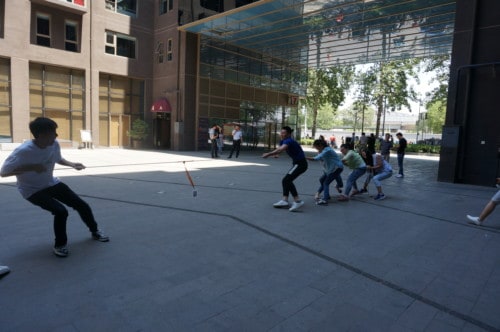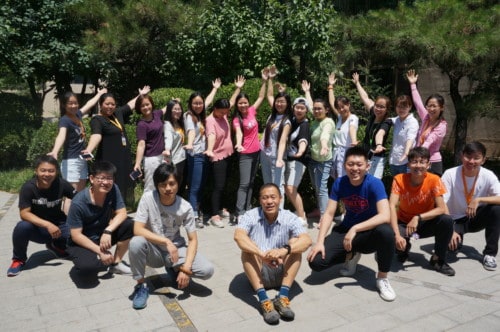By Philip Lew, XBOSoft CEO
It’s been 10 years since I founded XBOSoft, and I want to share a struggle that sparked the creation of the company. I have a habit of questioning how things are done, and love coming up with solutions. And I seek out software testers with a similar mindset.

We work hard, but we also play hard. At a team-building event in June.
The philosopher Seneca said, “Luck is what happens when preparation meets opportunity.” And I think that’s what happened when I founded XBOSoft in 2006 in China. I wanted the company to have a sole focus: Software quality through software testing — which was also the subject of my PhD.
Though my parents were of Chinese descent, it wasn’t until I was an adult that I visited China. But when I went, I found that I felt at home there — at home enough to get my PhD from Beihang University in Beijing, and settle down for the next 10 years.
Although I spend most of my time in the United States now, I still travel to China at least five times a year to meet with my excellent team of software testers, and consider it my home in many ways.
Navigating Differences in Teaching Styles
Here in the States, if you visit any major university campus, you see many Chinese students. Back when I was at Cornell, Chinese students comprised less than 10 percent of the student population. Today, Chinese immigrants continue to attend universities in the United States in large numbers — many of which highly stress the educational system here.
It’s built into the Chinese immigrant culture: Study and work hard. But, there’s a significant difference between the educational systems in China and those of the U.S. and Western Europe.
In China, students are expected to learn what their teachers want them to learn. There’s not much room for more than one answer. I wouldn’t say that teachers explicitly discourage creative thinking, but their methods (a lot due to huge class sizes and no teacher assistant/lab sessions like we have in the U.S.) dictate that there needs to be one right answer, and all others are wrong. Even if you had a good methodology and line of reasoning, if your answer is wrong, you are wrong.
This method of teaching and learning is deeply ingrained in the culture of China, which I recently wrote about in some depth. When I founded my company, I encountered this viewpoint head on. How to hire software testers who met the needs of my company proved a challenge.
Finding ideal testers
I found that when I hired the top engineering graduates of Chinese universities, they often didn’t perform well at XBOSoft. I realized it was because they were looking for the one right answer — but we needed employees who were creative, out-of-the-box thinkers looking for all answers, even if wrong.

XBOSoft employees are a creative bunch!
So I changed it up. I began hiring graduates whose grades weren’t the best, but who demonstrated an ability to think creatively and problem-solve on their own without having to constantly ask how they were supposed to approach a problem. During the interview process, I found it also helped to NOT recruit from top universities.
The students I started interviewing were hungrier and anxious to prove themselves. I wanted “fire in the belly” — which is not only hard to define, but hard to find.
I had to not only understand the context of the environment and culture, but develop methods to find these people with “fire in the belly.” This approach to hiring software testers has proved ideal, and our customers agree.
My current team of 50-plus software testers excels where it counts: In finding creative ways to get the defects out of our customers’ software.
Contact us to see how XBOSoft testers can help your company.

Leave A Comment